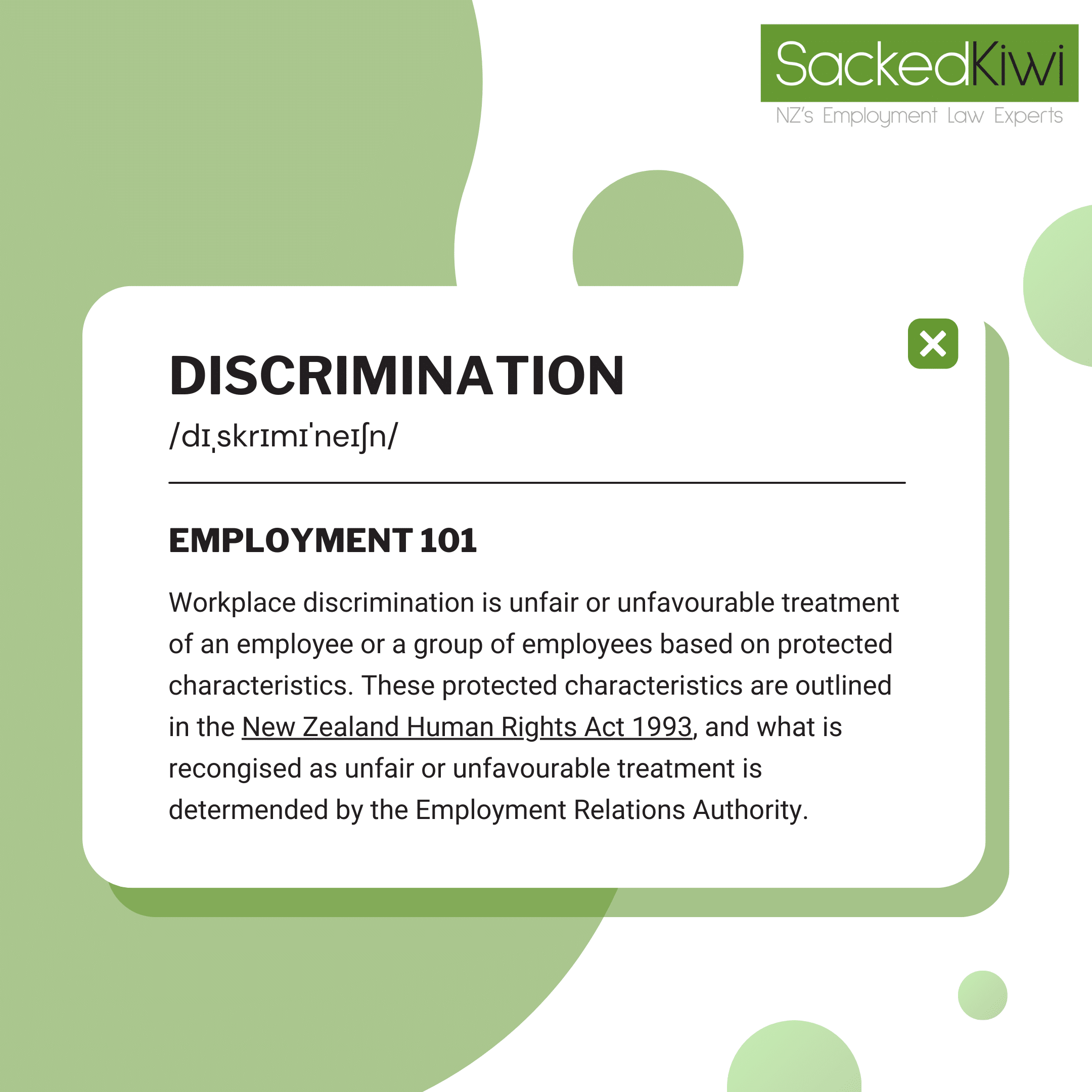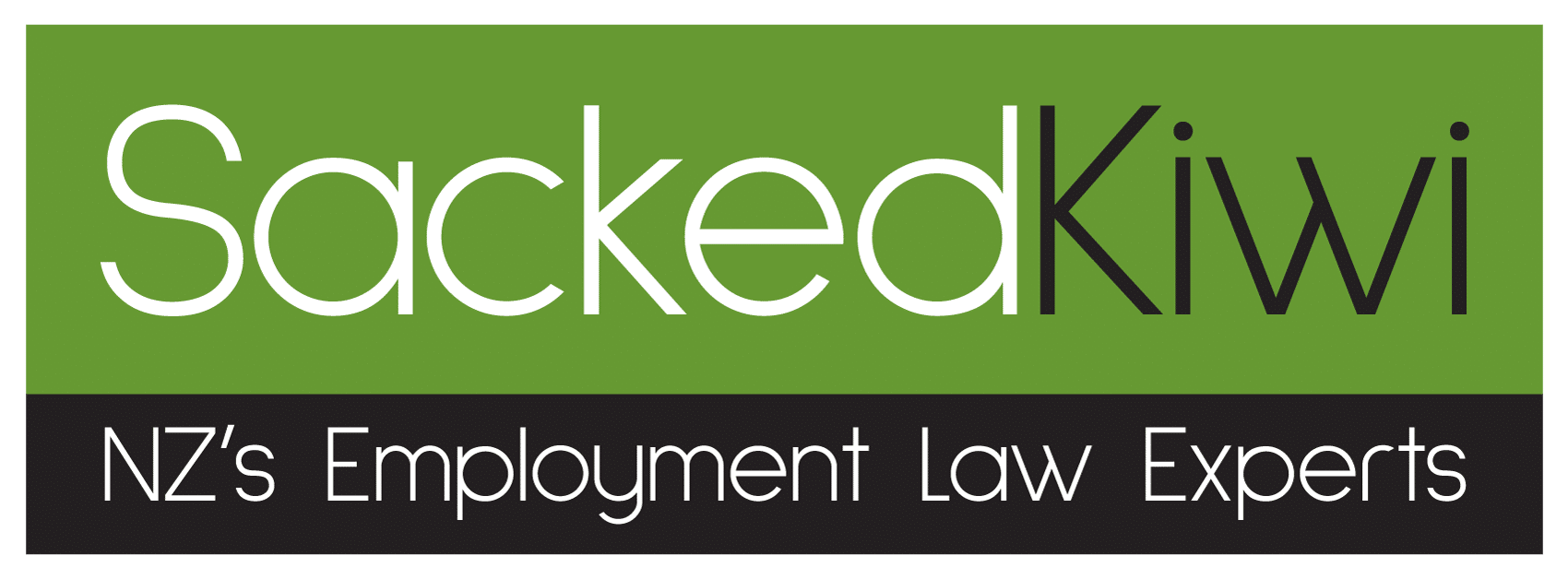
What is workplace discrimination?
Workplace discrimination is unfair or unfavourable treatment of an employee or a group of employees based on protected characteristics. These protected characteristics are outlined in the New Zealand Human Rights Act 1993, and what is recongised as unfair or unfavourable treatment is determended by the Employment Relations Authority.
As defined by the Act, protected characteristics include attributes such as race, gender, age, religion, disability, sexual orientation, marital status, family status, political opinion, and employment status. The Authority and Employment Court determine what is fair and unfair treatment based on these protected characterisitcs and industry standards.
What are the forms of workplace discrimination in New Zealand?
Discrimination can take various forms, including direct or indirect discrimination, harassment, and victimisation. More information and a brief overview of these is listed below:
- Direct discrimination: Direct Discrimination occurs when someone is treated less favourably than others because of a protected characteristic.
- Indirect Discrimination: Indirect discrimination arises when a policy, rule, or practice that appears neutral has a disproportionately adverse effect on individuals with specific characteristics.
- Harassment: Harassment involves unwelcome or offensive conduct related to a protected attribute that creates an intimidating, hostile, or humiliating work environment.
- Victimisation: Victimisation occurs when someone is treated unfairly because they’ve made a complaint or raised concerns about discrimination.
In New Zealand, the law prohibits discrimination in various aspects of employment, including recruitment, terms and conditions of employment, promotion, and dismissal. The Employment Relations Act 2000 and the Human Rights Act 1993 protect employees from discriminatory actions and provide avenues for redress if they experience discrimination in the workplace.
What are the common types of workplace discrimination?
Understanding the common types of workplace discrimination is crucial. Discrimination based on race, gender, age, disability, or sexual orientation persists as significant hurdles in many professional environments. Below is a list of the common types of workplace discrimination. If you have experienced any of the following, get in touch with our team of legal experts at Sacked Kiwi, including but not limited to:
1. Race or Ethnicity Discrimination:
Unfair treatment based on an individual’s race, nationality, or ethnic origin. In New Zealand, the Human Rights Act 1993 prohibits discrimination in employment based on race or ethnicity, ensuring equal opportunities and fair treatment for all employees.
2. Gender Discrimination:
Bias or unequal treatment towards individuals based on their gender. In New Zealand, gender discrimination in the workplace is prohibited under the Human Rights Act 1993, ensuring equality in hiring, pay, promotions, and working conditions regardless of gender identity.
3. Pregnancy and/or Childbirth Discrimination:
Unfair treatment of employees due to pregnancy, childbirth, or related conditions. The Employment Relations Act and the Human Rights Act in New Zealand protect pregnant employees from discrimination, ensuring they receive fair treatment, including accommodations and non-discrimination during and after pregnancy.
4. Religious Belief Discrimination:
Discrimination against individuals based on their religious beliefs or practices. New Zealand’s Human Rights Act protects employees from religious discrimination, ensuring they can practice their beliefs without prejudice or discrimination in the workplace.
5. Political Opinion Discrimination:
Unfair treatment based on an individual’s political views or affiliations. While political opinion is not explicitly listed as a protected characteristic in New Zealand’s employment law, discriminatory actions due to political views can be addressed under broader anti-discrimination legislation.
6. Ageism:
Prejudice or discrimination against individuals due to their age. In New Zealand, the Human Rights Act safeguards against age discrimination in employment, ensuring fair treatment and opportunities for individuals of all age groups.
7. Disability Discrimination:
Unfair treatment of individuals due to physical or mental disabilities. The Human Rights Act and the Disability Discrimination Act in New Zealand protect disabled individuals from discrimination, requiring employers to provide reasonable accommodations and equal opportunities for disabled employees.
8. Sexuality and/or Gender Identity Discrimination:
Bias or discrimination against individuals based on their sexual orientation or gender identity. New Zealand’s employment laws prohibit discrimination based on sexuality and gender identity, ensuring a safe and inclusive workplace for LGBTQIA+ individuals.
Key Term Takeaways
We know these matters can be complex so the Sacked Kiwi team has broken it down into a few key takeaways:
- Definition: Workplace discrimination is unfair treatment based on protected characteristics (e.g., race, gender, age).
- Forms of Discrimination:
-
- Direct Discrimination:
- Less favourable treatment due to a protected characteristic.
- Direct Discrimination:
-
- Indirect Discrimination:
- Neutral policies that disproportionately affect certain groups.
- Indirect Discrimination:
-
- Harassment:
- Unwelcome conduct creating a hostile work environment.
- Harassment:
-
- Victimisation:
- Unfair treatment for complaining about discrimination.
- Victimisation:
- Common Types: Race, gender, age, disability, sexual orientation, pregnancy, religion, political opinion.
- Legal Framework in New Zealand: Governed by the Employment Relations Act 2000 and Human Rights Act 1993. Cases are held by the Employment Relations Authority (ERA) and subsquently the Employment Court.
- Steps to Address:
-
- Document incidents and gather evidence.
- Seek legal advice and support.
- Lodge a grievance with the ERA.
- Compensation: Remedies may include reinstatement, lost wages, and compensation for hurt feelings.
Commonly Asked Questions
What to do if I am facing discrimination at work?
If you believe you are facing unfair or unfavourable treatment based on race, gender, age, religion, disability, sexual orientation, marital status, family status, political opinion, or employment status, reach out to Sacked Kiwi to get in touch with a legal professional.
Can I sue my employer for discrimination?
In New Zealand, if an employee faces discrimination in the workplace, legal recourse is available through the Human Rights Act 1993 and the Employment Relations Act 2000.
While the legal system aims to address discrimination issues, the process typically involves exhausting internal dispute resolution mechanisms before considering legal action. Filing a personal grievance claim with the Employment Relations Authority (ERA) is often the initial step, requiring evidence to substantiate the discrimination claim.
The ERA investigates complaints and attempts mediation to resolve disputes. If mediation fails, the case might proceed to a formal hearing where a determination is made. Successful cases may result in remedies like compensation or reinstatement.
If you think you believe you have faced discrimination against your employer, get in contact with our team of legal experts at Sacked Kiwi. Contact Us.
What are my legal rights as an employee?
In New Zealand, employees have extensive legal rights protecting them from various forms of discrimination in the workplace.
The Human Rights Act 1993 safeguards against discrimination based on protected characteristics such as race, gender, age, disability, religious belief, political opinion, sexual orientation, and more.
Additionally, the Employment Relations Act 2000 protects employees’ rights, including fair treatment, non-discrimination, and adherence to minimum employment standards.
If an employee faces discrimination, they have the right to lodge a personal grievance with the Employment Relations Authority, ensuring their concerns are addressed and potentially resolved through mediation or formal hearings.
If you are facing discrimination in the workplace get in contact with our team of legal professionals here at Sacked Kiwi. Contact Us [hyperlinked to our contact page]
What are the key elements of a workplace discrimination grievance?
In order for a strong personal grievance claim for workplace discrimination an employee needs to prove that it is probable that the discrimination causes the treatment experienced. The Authority tends to consider this in the context of what other employees are experience as baseline. The key is to then show that your treatment is exceptional in comparison to your colleagues.
What are grounds for a discrimination in the workplace claim?
You have grounds for a discrimination claim in the workplace if that discrimination based on race, gender, age, disability, or sexual orientation persists as significant hurdles in many professional environments. If you have experienced any of the following or think you are being discriminated against in a different way, get in touch with our team of legal experts at Sacked Kiwi
What evidence do I need to prove workplace discrimination?
When preparing a discrimination claim in the workplace in New Zealand, gathering substantial evidence is crucial to substantiate the allegations. Evidence may include:
- Documentation:
- Any written records, emails, memos, or letters that highlight discriminatory actions, remarks, or policies. Screenshots of text messages and recordings of conversations can also be used.
- Witness Statements:
- Statements from coworkers, supervisors, or others who observed or experienced similar discriminatory behaviour.
- Performance Reviews:
- Discrepancies in evaluations or feedback that suggest bias or unfair treatment based on protected characteristics.
- Comparative Evidence:
- Showing how individuals with similar qualifications or performance were treated differently due to protected characteristics.
- Communication Records:
- Evidence of complaints or requests made to HR, management, or higher authorities regarding discrimination, and the responses received.
- Personal Records:
- Any notes, diary entries, or records documenting instances of discrimination, including dates, times, and details of incidents.
What compensation can I get for discrimination in the workplace?
In New Zealand, the Employment Relations Authority (ERA) typically manages claims regarding unjustifiable dismissal in employment cases. When an employee’s claim of unjustifiable dismissal is successful, the ERA aims to offer remedies to address the injustice. These remedies often include reinstatement, compensation for lost wages, compensation for hurt feelings, and covering costs incurred during the legal process.
The amount awarded as compensation can vary, contingent upon the specific circumstances of the case. The ERA or the Employment Court determines this after assessing various factors involved. Lost wages compensation aims to recompense the employee for the actual income loss, typically extending up to a 13-week period post-dismissal. In exceptional cases, where warranted, compensation may extend beyond this period. However, this requires the employee to demonstrate efforts in seeking alternative employment during this time or provide valid reasons for not doing so.
Compensation for hurt feelings hinges on several factors. The Member or Judge presiding over the case considers aspects such as the duration of the employee’s service, the degree of humiliation resulting from the dismissal, and the actual impact suffered. These considerations assist in determining the fair compensation owed to the employee for the emotional distress endured due to the unjustifiable dismissal.
What is the process for claiming discrimination with the ERA?
If you are claiming discrimination or harassment in the workplace, you will be lodging a personal grievance with the Employment Relation Authority. Check out our personal grievance education hub page here for more information about the Sacked Kiwi Process.
Legal Disclaimer: The content posted on the Sacked Kiwis website should not be considered or relied upon as legal advice or opinion. The information presented here is not intended to serve as legal guidance. Over time, laws and regulations evolve, potentially altering the accuracy of previously shared information. Updates in jurisprudence or legislation, which could happen without immediate notice, may render the legal information on this platform outdated or obsolete.
Seeking legal advice when sumbiting a personal grievance is advisable to ascertain rights, obligations, and potential avenues for resolution. Get in touch with our Team of Legal Experts. Contact them here!
Should you need employment advice, please don’t hesitate to contact us through our toll-free hotline.

